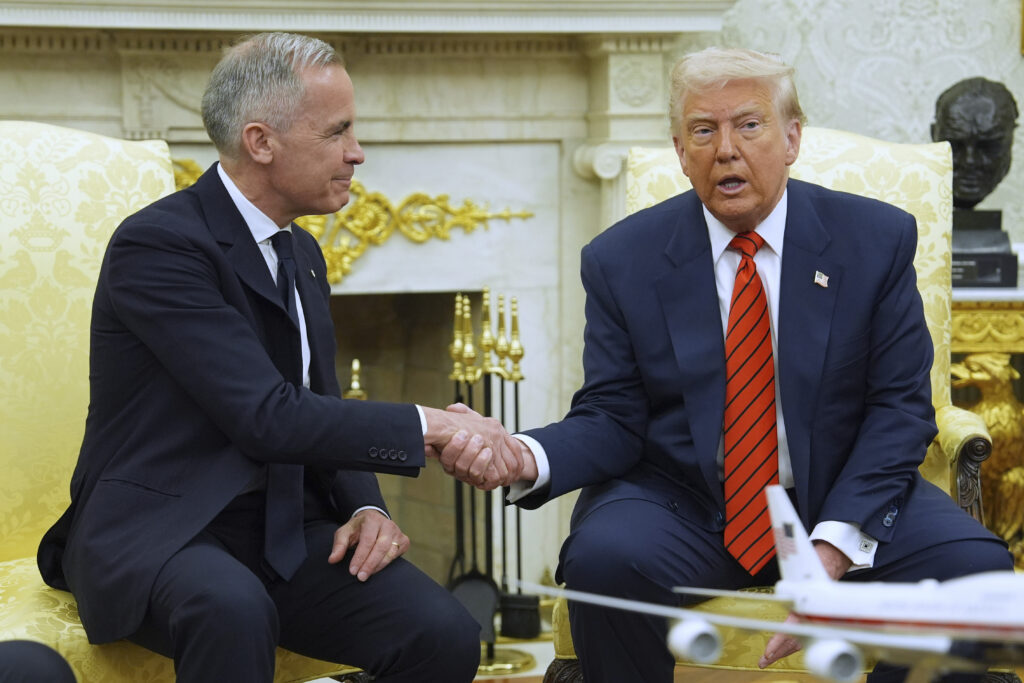Canada, Using Its Hockey Sense, Can Block Trump’s Next Shot on Tariffs
President terminates all talk of trade with our northern neighbor.

President Trump is “terminating all discussions on trade” with Canada in response to its “egregious” and “foolish” tax on America’s tech companies. Within seven days, he’ll be setting a tariff rate for Ottawa’s imports, giving them time to shift from “elbows up” to a gameplan with better hockey sense.
In a Truth Social post on Friday, Mr. Trump wrote that Canada is “putting a Digital Services Tax on our American Technology Companies.” The three percent levy, he said, is “a direct and blatant attack on our country.”
Mr. Trump called Canada “a very difficult country to trade with,” charging American farmers “as much as 400 percent tariffs.” He said that Canada “copied Europe” with the new tax, restating his position that it’s E.U.’s policies that he finds most objectionable — a window of opportunity for Canada to set itself apart.
Prime Minister Carney, serving in his first elected office, has yet to shift from campaigning to diplomacy and governing. He’s let fester resentment over Mr. Trump’s suggestion that Canada become America’s “cherished 51st state.”

Mr. Carney delights in poking his stick into Mr. Trump’s ribs, although it’s self-defeating. In March, he railed against his counterpart’s “unjustified tariffs.” Of course, each nation regulates its own domestic affairs and bristles at infringement on that sovereignty.
That’s Mr. Trump’s view. “Canada put a charge on some of our companies,” he told reporters at the Oval Office on Friday. “If anybody’s going to affect a U.S. company, I want it to be us — and if they’re going to have to pay a penalty or a fine, let it be to us.”
Mr. Trump stressed that Americans have “a great relationship with the people of Canada,” in contrast to Mr. Carney’s views of those south of the 49th Parallel. After a cabinet meeting in March, he declared “the old relationship” with America is “over,” calling America “no longer a reliable partner.”
On the campaign trail, Mr. Carney embraced the hostile “elbows up” slogan, a reference to hockey players fending off opponents who get too close. That rhetoric helped win the election, but bluster can’t knock a country with 8.5 times Canada’s population off the puck.
Prime Minister Pierre Trudeau understood the disparity, telling President Nixon that “living next to” America is like “sleeping with an elephant.” It may be “friendly and even-tempered,” but “one is affected by every twitch and grunt.”
In his Oval Office remarks, Mr. Trump displayed the power of being a pachyderm. “It doesn’t matter to me,” he said, if Canada removes its tech tax. “We have all the cards, every single one.” He doesn’t “want to do anything bad,” he added, “but economically, we have such power over Canada.”
It may rankle Mr. Carney, but Team Canada lacks the economic muscle to impose their will on Team USA. America’s GDP in 2024 was $29.2 trillion. That’s 13 times larger than the $2.24 trillion of its northern neighbor which, were it to join the union, would be the poorest state.
A hockey coach faced with that power imbalance wouldn’t tell his players to drop the gloves and start swinging. He’d emphasize his team’s other talents to give them the best chance of victory.
Canadians who consider Mr. Trump a “goon,” or dirty player who pounds opponents into submission, would understand the metaphor if Mr. Carney invoked it. Fighting brawn with brains is how hockey’s top scorers have long dealt with aggressive opponents, knowing they gain nothing by getting hurt.
Teams also avoid insults that opponents can use as motivation. Mr. Carney can learn from that by employing the “niceness” his country claims as a virtue rather than antagonizing their neighbor. Geography and language make both countries better trading partners for each other than Brussels or Beijing.
Mr. Carney has up to seven days to rework his game plan, starting with whether the new tax is worth the cost of retaliatory tariffs. He can’t beat Mr. Trump into submission. But he can play a smarter game, lower his elbows, and score with a trade deal that makes Canadians cheer.

